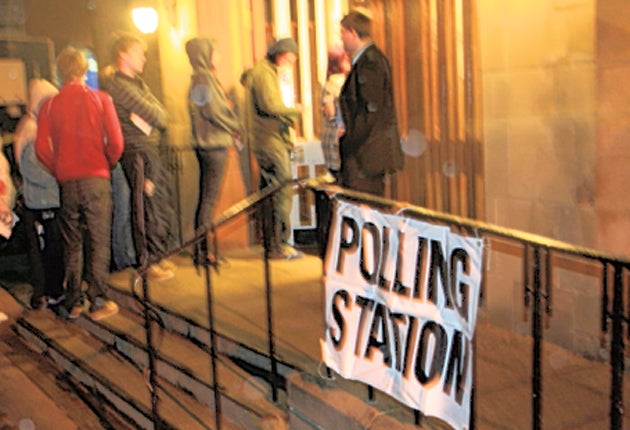Urgent reforms demanded after election night chaos

Your support helps us to tell the story
From reproductive rights to climate change to Big Tech, The Independent is on the ground when the story is developing. Whether it's investigating the financials of Elon Musk's pro-Trump PAC or producing our latest documentary, 'The A Word', which shines a light on the American women fighting for reproductive rights, we know how important it is to parse out the facts from the messaging.
At such a critical moment in US history, we need reporters on the ground. Your donation allows us to keep sending journalists to speak to both sides of the story.
The Independent is trusted by Americans across the entire political spectrum. And unlike many other quality news outlets, we choose not to lock Americans out of our reporting and analysis with paywalls. We believe quality journalism should be available to everyone, paid for by those who can afford it.
Your support makes all the difference.More than 1,000 voters were prevented from casting their ballot at the election because of poor planning by councils who were slow to react to crowds of late arrivals, a scathing assessment of the polling day chaos has found.
Urgent reforms are needed to prevent a repeat of the election night scenes on 6 May, according to the interim report by the Electoral Commission.
It admitted the system on polling day broke down in some places, and that a failure to plan for late arrivals to the polling stations resulted in 1,200 people being unable to cast their vote. But it laid the blame squarely at the door of local councils and the returning officers charged with overseeing election preparations.
Queues built up in 16 constituencies when polling stations closed at 10pm. However, the Electoral Commission's assessment blamed a failure by local councils to use their initiative and allow those in the queue to cast a vote after the 10pm deadline. The decision angered voters, and in some places they staged sit-ins.
Sheffield Hallam, the constituency of the Deputy Prime Minister, Nick Clegg, appeared to have experienced the worst problems; 340 voters were affected, according to the interim assessment.
A sit-in took place in Hackney, East London, when those queuing at the cut-off time were told they would not be able to vote.
"We are calling for urgent changes to electoral law so that any elector who is entitled to vote and who is queuing at a polling station at the close of poll will be allowed to vote," said Jenny Watson, the chairman of the commission. "Our review found that some people who arrived before polls closed were unable to vote because returning officers did not have the discretion to let them vote after 10pm.
"Returning officers in the areas affected did not properly plan for, or react to, polling day problems," she added. "That is unacceptable. People in these areas were badly let down and have every right to be angry. The current system is too fragmented, with hundreds of independent returning officers making their own decisions."
Councils in which constituents were prevented from voting now face a legal challenge. Lawyers acting on behalf of those claiming they were needlessly disenfranchised will argue that a lack of staff was to blame for the fiasco.
Other areas ran out of ballot papers as they had not anticipated the high turnout in some close-run constituencies. Lawyers are to challenge councils under human rights law.
Join our commenting forum
Join thought-provoking conversations, follow other Independent readers and see their replies
Comments